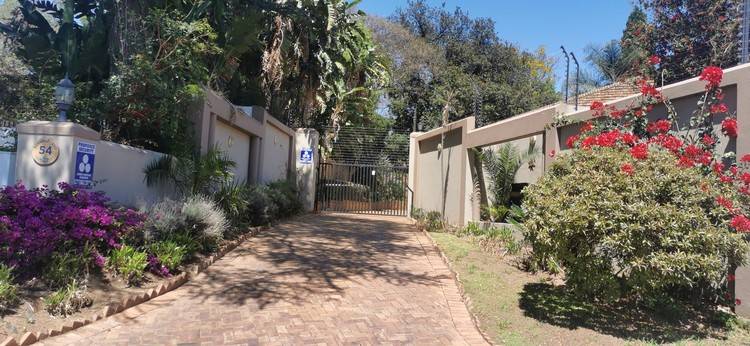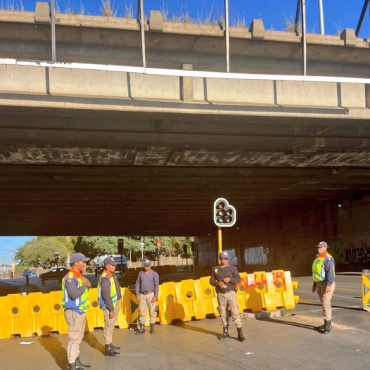-
play_arrow
On The Street On The Air | Kaya 959
Fikile Mbalula in row over frozen luxury house
GroundUp Raymond Joseph
Affidavits claim he borrowed R3-million from Lottery bigwig’s wife

The wife of former National Lotteries Commission chief operating office Philemon Letwaba has claimed under oath that her company loaned R3-million to then-sports minister Fikile Mbalula to help him buy a luxury home in the upmarket suburb of Bryanston in Johannesburg.
Letwaba resigned under a cloud while on suspension pending a disciplinary inquiry, where he would have faced charges of money laundering and abusing his position to enrich himself and his family.
His wife, Rebotile Malomane, the sole director of Ironbridge Travelling Agency and Events, made her bombshell claim in an affidavit lodged as part of an application to overturn a preservation order on the house, frozen by the Special Tribunal.
Besides the Bryanston house, the Tribunal also froze two other properties linked to Letwaba, including Malomane’s own home in a luxury Pretoria gated estate. This, after hearing evidence from the National Prosecuting Authority (NPA) Assets Forfeiture Unit that they were all bought with money syphoned from lottery grants.
Malomane’s claim about the loan to Mbalula was made in a confirmatory affidavit submitted in support of a founding affidavit by Letwaba’s older brother, Johannes Letwaba.
Their affidavits form part of an attempt to lift the preservation order on the house.
Malomane and Johannes Letwaba both claim that the funds for the alleged loan to Mbalula came from fees that Ironbridge was paid by Lulamisa Community Development for work it did on Durban’s Commonwealth Games bid. Lulamisa received R80-million from the NLC to help fund the bid.
Mbalula, now ANC secretary-general, had approached Malomane for help as he was “apparently … short of R3-million to secure the property”, Letwaba wrote in his affidavit.
Responding to detailed questions about the house and the claims made in the affidavit, including that he borrowed R3-million from Ironbridge, Mbalula said: “I cannot answer to any affidavit not written by myself.”
He told GroundUp that he wanted “to restate” the statement – in this story – by Mr. Esethu Hasane, his former spokesperson. Hasane previously told GroundUp: “The Minister has nothing to do with the mentioned property. Any intention to buy it in the past did not happen. Therefore, the questions about this property are best placed for answers by the owners of the property and must be referred to them. The Minister cannot account for a property that he does not own.”
The Mbalulas had initially made a cash offer of R5.6-million for the house “on behalf of a company to be formed” but then suddenly dropped out.
The original offer to purchase was in the name of Mbalula and his wife, Nozuko. Crossed out on the document are the words” “for and on behalf of a company to be formed”. Nozuko Mbalula signed the offer, but her signature was then also crossed out. It was never signed by the sellers.
Instead, Upbrand Properties, a company that has been at the centre of lottery corruption and that is closely linked to the Letwaba brothers, bought the house after making an identical offer. Solly Siweya, an associate of Mbalula’s, acted on behalf of Upbrand.
Letwaba claimed in his affidavit that “the understanding … even though this was not reduced to writing, [was] that Upbrand will hold the property until such time as the R3-million was repaid.”
There is no explanation so far as to where the balance of R2.6-million of the purchase price of the house came from, even though Letwaba and Malomane both say that Ironbridge only contributed R3-million towards the purchase price.
Letwaba wrote: “Ms Malomane was prepared to loan the monies she earned in the performance of the contract with Lulamisa, to Mr Mbalula, on delivery of some form of security to ensure repayment of the loan.
“I don’t know who made payment of the balance, I can only assume it was paid (I note with interest the fact that applicant [the NPA] and/or the SIU failed to advise by whom the balance was paid).”
Letwaba further wrote: “Despite him having allegedly renounced his association with the property publicly, it didn’t prevent Mr Mbalula from moving tenants into the Bryanston property, him appropriating the rent paid”.
“As Mr Mbalula failed to repay the loan, Upbrand took action and had the tenants evicted from the property.”
In her affidavit, Malomane wrote: “I further confirm that Ironbridge never entered into a written loan agreement with Mr Mbalula. The logical explanation, therefore, being that in the event of his default, Upbrand would utilise the property to recover any outstanding monies, it acquired a real right as being the registered owner of the property.”
“To the best of my belief, Mr Mbalula and his family moved into the property and have since vacated. As matters stand, he is in default and failed to repay the loan.”
She said that even though Johannes Letwaba “constantly fills me in as to the state of affairs in respect of the Bryanston property, I have no personal involvement”.
The house was subsequently offered for sale at less than Upbrand paid for it. But it was still unsold when the preservation order was granted.
Mbalula, in an unclear response to GroundUp, appears to deny ever having moved onto the property. He did not answer specific questions from GroundUp regarding the allegations in either Letwaba or Malomane’s affidavits
Bank statements
In a telephone interview, Siweya claimed that the affidavits by Malomane and Johannes Letwaba were an “attempt by Phillemon [Letwaba] to try and drag everyone into his problems.”
Siweya said that “as far as I am aware” Lulamisa did not pay a cent for the house.”
He added: “In my two years as chairman of Lulamisa, I never interacted with Rebotile [Malomane] as a supplier, but maybe other staff members did. She [Malomane] was never part of Ironbridge at this time.” (Malomane was appointed as a director of Ironbridge in February 2017).
He denied that Ironbridge or Malomane had worked on the Commonwealth bid. “She never sent an invoice to me or anyone else at Lulamisa.”
Told that Lulamisa bank statements reflected payments to Ironbridge from Lulamisa and that Malomane had included a list of these alleged payments amounting to almost R6.4-million with her affidavit, Siweya said he was not aware of them.
But then he appeared to contradict himself when he said that Malomane had worked for Lulamisa as “an administrator” and was paid a salary.
“She was never contracted. I am not sure why Lulamisa might have paid Ironbridge money. Perhaps someone else made these payments. I’ll have to check.”
Siweya said he was aware that Mbalula had wanted to relocate, but “he didn’t have the money. I do not know if Mbalula moved in. I have always seen him at his other house.”
Affidavits
GroundUp previously reported on the R80-million grant to Lulamisa, which was paid in two tranches of R64-million in 2015/16 and a further R16-million in 2016/17.
But neither Lulamisa nor the NLC, then run by a different, very opaque executive and Board, who have been implicated in the corruption that overwhelmed the organisation on their watch, would say what the money was for and how it was spent.
In his affidavit. Johannes Letwaba said: “At the time Mr Mbalula approached her [Malomane], Ironbridge had involvement in a contract with the Lulamisa Community Development Organisation, a registered non-profit organisation.”
Lulamisa was awarded grant funding totalling R80-million by the NLC, for purposes of “bidding for Durban 2022”.
The grant funding was awarded “to enable Lulamisa to administer and pay for expenses associated with the bid to secure the 2022 Commonwealth Games for Durban,” Letwaba wrote.
The bid process was spearheaded by the South African Sports Confederation and Olympics Committee (SASCOC), which was also awarded a total of R64.7-million between 2014 and 2016 for other projects.
“Because Ironbridge … was not in the business of acquiring property, Ms Malomane had no intent to bring this into the sphere of her business. After consideration it was agreed that the Bryanston property will be held in the name of Upbrand, it being involved in the property market,” Letwaba wrote.
As a result, he said, Upbrand signed an offer to purchase the property for an amount of R5.6-million and became the registered owner of the Bryanston property on 27 July 2016.
“Allow me to add that Mr Mbalula was not prepared to pay the transfer costs, seeing that the property was transferred to Upbrand, for which reason it [Upbrand] made payment of the transfer costs.”
Letwaba wrote: “As a result, Upbrand became the registered owner of the Bryanston property on 27 July 2016, and to the best of my belief Mr Mbalula and his family settled into the residence”.
“I have reason to believe that once questions were raised regarding the property transaction, it caused for him and his family to vacate the property,” Letwaba wrote.
Malomane also claimed in her affidavit that Mbalula had stayed briefly in the house.
Several sources have also told GroundUp that Mbalula lived there briefly before moving out. They include an SIU official with direct knowledge of the investigation involving the house and two security guards working at nearby houses.
Another source said he attended a party for Mbalula’s 45th birthday at the house. He said the party was held inside and outside of a gazebo at the back of the property. The source, who identified the house from photographs shown to him by GroundUp, also named two prominent ANC members he said were at the party.
But Mbalula denied this in his response to GroundUp and said that his 45th birthday was at the house that he currently lives in.
GroundView: Fikile Mbalula – at best a man of poor judgment
The above story is complicated and contains accusations and counter-accusations. Did Fikile Mbalula live in the house in Bryanston? Did he take a loan from Upbrand, from money originating from the NLC? We don’t know the precise answers to these questions. There are convoluted agreements, some in writing, some verbal, involving an array of dodgy characters, some who have looted tens of millions of rands from the Lottery.
Mbalula is a man who loves the high-life and who adorns himself with finery. When he finished his 12-year stint as a minister in April, he was earning over R2-million a year. He was an elite earner, by South African standards, throughout this period. Yet this perhaps wasn’t enough to sustain the lifestyle he desired.
In the best-case scenario Mbalula did not act corruptly in relation to the Bryanston house. But he unequivocally showed poor judgment in getting involved with the people who have now written affidavits implicating him.
In a country with a more competitive democracy, it is highly likely Mbalula’s political career, marked by several failures, especially the deterioration of the police and Metrorail while he was the minister responsible for these entities, would have ended long ago. Instead, he holds one of the most powerful positions in the ANC.
Now Read: Powerball Results: Draw Tuesday, 27 June 2023
Written by: Dohne
Fikile Mbalula National Lottery funded house
Similar posts
-
MORE ARTICLES

Smit Street under M1 highway remains closed, motorists urged to use alternative routes

Thieves are targeting human wigs in Joburg and Cape Town

The Kolisi’s meet up with England captain Owen Farrell

Investigation launched into Glenvista High School fight between teacher and learner

Nthati Moshesh’s heartfelt tribute to Mpho Sebeng
-
QUICK LINKS
UpComing Shows

Feel Good
With Andy Maqondwana
Feel good about feeling good! That's exactly what The Feel-Good show is about. An escape from the negativity that surrounds us, indulging you in good feels. Pass it on to one and all. Spread the good feeling around Gauteng with Andy Maqondwana.
close
Kaya Biz
With Gugulethu Mfuphi
The world of business is simplified for you by Kaya Biz with Gugulethu Mfuphi. This fast-paced award-winning business show talks to the corporate giants as well as up and coming entrepreneurs about their wins and challenges. Gugulethu invites guests to offer their analyses of markets and economies, and also delves into issues of personal financial wellness. Kaya Biz airs Mondays to Thursdays 18h00 to 19h00.
close
Point of View
With Phemelo Motene
Point of View with Phemelo Motene delves into the day’s current affairs, touches on real issues that affect people’s daily lives and shares expert advice on questions posed by the audience. Mondays to Thursdays 20:00 to 22:00.
close
959 Music Weekdays
Kaya 959 Hits
Real. Familiar. Memorable. Kaya 959 brings you the music you know and love from our playlist. Uninterrupted. Thursdays 20h00 to 21h00
close
The Best T in the City
With T Bose
He has held it down in the world of mid-morning radio with the best music, riveting topics, brilliant mixes and interesting guests. Every weekday, The Best T proves why he is the BEST by connecting to you like only your bro or favourite uncle could. He lets his listeners dictate the songs they want to hear in the ever-popular Top 10 at 10, and his Three Teaspoons never run out. Catch The Best T in the City Mondays to Fridays from 09h00 to 12h00.
closeConnect with Kaya 959
DownLoad Our Mobile App
© 2024 Kaya 959 | On The Street On The Air











